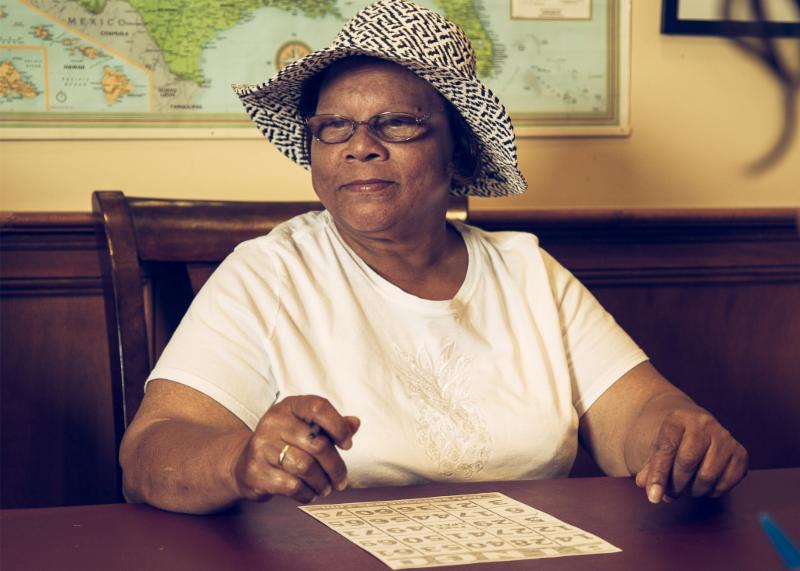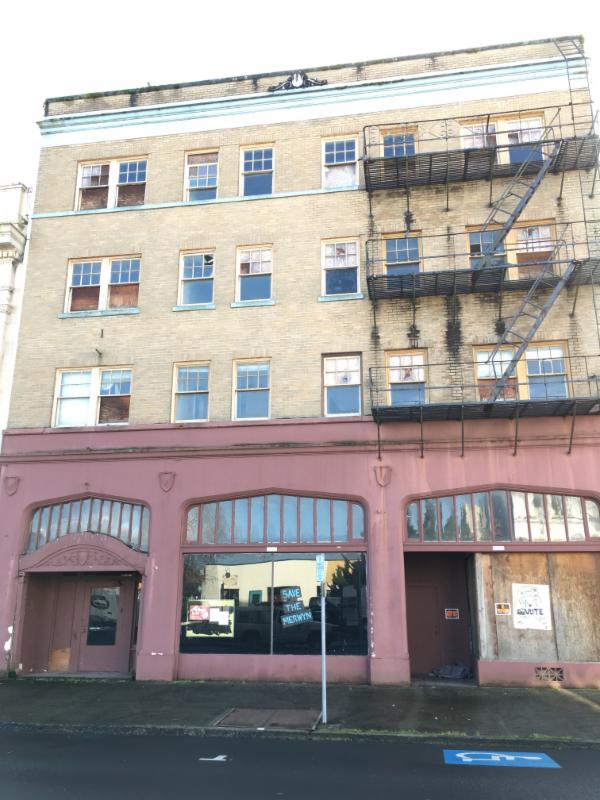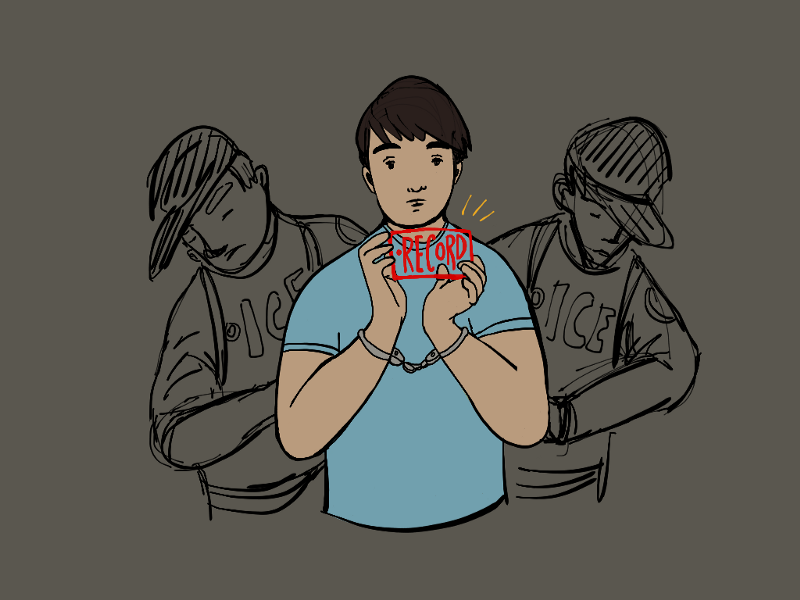|
|
Like us on Facebook and
k
eep up with IHI news,
events, and stories!
Please consider making a tax-deductible donation to help Innovative Housing, Inc. support the hard-working families and individuals who live in our housing. 
You may make a secure donation online at our website! You can also mail your donation to: Innovative Housing, Inc. 219 N.W. Second Ave. Portland, OR 97209 Thank you! ------------------------------ If you prefer to receive this newsletter in print, please contact us at [email protected] ------------------------------ |
|
|
From IHI's Executive Director
Sarah J. Stevenson
As I review the contents of this quarter's newsletter, I experience inspiration and assurance that our work is making a difference, alongside staggering emotion at the thought that no matter what we do, someone's child is having nightmares about being left behind while their parents are taken out of the country against their will. It feels like a turbulent time on many fronts - the extreme ups and downs of politics, housing policy, and human need seem to reflect the erratic spring weather.
I have always felt that perspective is essential to maintaining a sense of calm and control. My internal dialogue often goes something like, "xyz isn't so bad, we'll get through it - things could be so much worse . . . ." That strategy only works, however, when you can think of a situation that is actually worse. At work and in my personal life, I've been fortunate enough to almost always know that things aren't as bad as they could be, and that gives me the power to take steps toward solutions. But what happens when that isn't the case? How does a 13 year old with a limited world view find the perspective to determine that a life sentence in prison isn't the worst thing that could happen? How does a parent with limited funds and no legal standing in the United States find perspective on being deported and leaving behind a young child with special needs?
I think the answer is that usually they can't. And
our
answer is that we need to help as best we are able. It isn't always easy to think of a way to do that when people are facing such unforgiving situations. Sometimes all we can do is be compassionate. We also need to be careful about assuming so much self-importance that we hobble ourselves by needing to do too much or nothing at all. We can't change immigration law, but we can organize to express opposition. We can't stop kids from falling into the criminal justice system, but we can support programs that provide a way out. We can't house everyone in Portland, but we can create more affordable homes one building at a time. Tiny steps, shared work, and continuous improvement. In that spirit, I encourage each of you to think of an intractable and overwhelming problem and take one small step toward making it better. Clean your basement, email your congressperson, prepare a dinner, read to a child, share a hug. While we can't fix everything, people are resilient and we can help each other through challenging times. It has been a long, hard winter, but spring is here and change is coming-let's all be part of it.
|
IHI is exploring a new historic preservation project in Astoria, Oregon. If all goes as hoped, the 91 year-old Merwyn Hotel could be reborn as 40 affordable workforce apartments in the growing downtown area of Astoria.
Astoria was originally established as Fort George by John Jacob Astor in 1811 and used as the west coast base of the Hudson Bay Company. In 1825, Fort Vancouver was deemed a more strategic location and the settlement was abandoned until the 1840's when it was 'rediscovered' and revived. Astoria grew rapidly, with immigrants coming to work in the fisheries, canneries and forest industries. Space was limited due to its geography of steep hills running down to the bay and swamp, so the town started filling in the bay, constructing buildings, wooden streets, and wooden sidewalks on pilings. With some businesses accessible by street and others by boat, Astoria was called the "Venice of the West." In 1882, Astoria experienced its first large fire - wooden building, pilings, streets, and sidewalks throughout downtown all went up in flames. Rebuilding started immediately and progressed quickly, thanks to the arrival of the railroad in 1898.
A second major fire raged throug
 h Astoria's downtown in 1922. The rebuilding this time focused on concrete instead of wood, with concrete "chair walls" on top of piles. Many hotels were built after the fire to host Portland businessmen who traveled to monitor their investments in the rebuilding efforts. The Merwyn was one of these hotels. It was built in 1926 by an Astoria businessman named Wenkebach, who named it in honor of his earlier Hotel Merwyn that burned in the fire of 1922. It is an example of Late Commercial architectural style with Renaissance detailing and is considered one of the best surviving examples of the style in Astoria today. Special architectural features include flat arched multi-paned transom windows above the storefront, plaster shield ornaments, and a recently rediscovered Carrara marble storefront base. With 15-foot ceilings, open spans, a sweeping solid Art Nouveau stair rail, fashionable one panel doors, and lightwells that provided light and air for every room, the Merwyn was state-of-the-art for Oregon in the 1920's.
h Astoria's downtown in 1922. The rebuilding this time focused on concrete instead of wood, with concrete "chair walls" on top of piles. Many hotels were built after the fire to host Portland businessmen who traveled to monitor their investments in the rebuilding efforts. The Merwyn was one of these hotels. It was built in 1926 by an Astoria businessman named Wenkebach, who named it in honor of his earlier Hotel Merwyn that burned in the fire of 1922. It is an example of Late Commercial architectural style with Renaissance detailing and is considered one of the best surviving examples of the style in Astoria today. Special architectural features include flat arched multi-paned transom windows above the storefront, plaster shield ornaments, and a recently rediscovered Carrara marble storefront base. With 15-foot ceilings, open spans, a sweeping solid Art Nouveau stair rail, fashionable one panel doors, and lightwells that provided light and air for every room, the Merwyn was state-of-the-art for Oregon in the 1920's.
It isn't state-of-the-art today. In fact, the Merwyn is in rough shape, with most of its west wall ready to succumb to wind and weather. IHI is now completing its due diligence to see if we can turn four stories of brick, concrete, and history into new housing for a still-growing Astoria. The ghost of August Erickson might even give us a hand with this project! He ran the Louvre Saloon in Astoria just five blocks from the Merwyn that, coincidentally, Mr. Wenkebach later purchased. Perhaps Gus's ghost will smile upon the Merwyn and bring IHI good fortune as he did with our renovation of Erickson's Saloon in Old Town.
|
|
Undocumented and Uncertain
The Presidential election and current political climate are affecting all of us in different ways. Many low-income residents are concerned about their housing, their medical care, and other benefits. As we struggle to respond and provide support in these uncertain times, one of the most challenging situations we face involves IHI's undocumented residents. We do not require a social security number to access our housing - as a result, IHI houses a lot of undocumented people and right now they are scared. Many of IHI's families are of mixed-citizenship, which means parents may be undocumented while their children are citizens. This poses an almost incomprehensible question for families - what happens to the children if both parents are deported?
IHI's Resident Services Coordinator, Marisa Monteverde, has been working with mixed-citizenship families to create family emergency plans. These plans help families prepare for a situation in which one or both parents are detained and deported. The plans are time consuming and sometimes expensive to prepare, but are crucial to have in place. Marisa has offered multiple workshops to help families understand what they need and how to prepare for the worst. She also meets with families to create a legal guardian affidavit, prepare important information sheets for each child, help apply for passports, obtain copies of IDs
 , birth certificates, immunization records, and gather other pertinent information. All of these documents are then kept in a secure place that can be accessed by the children's legal guardians. Every child carries a copy of their legal guardian form with them to school so the school knows who has custody if parents are detained or deported. Guardians can make medical and educational decisions for children, and work with families to create family reunification plans. These plans look different for each family-for most with young children, families ask the person named as guardian to bring their children to their country of origin when the school ye
ar ends. For families with children in high school, they may requ
est that their children remain with the guardian until they graduate from high school.
, birth certificates, immunization records, and gather other pertinent information. All of these documents are then kept in a secure place that can be accessed by the children's legal guardians. Every child carries a copy of their legal guardian form with them to school so the school knows who has custody if parents are detained or deported. Guardians can make medical and educational decisions for children, and work with families to create family reunification plans. These plans look different for each family-for most with young children, families ask the person named as guardian to bring their children to their country of origin when the school ye
ar ends. For families with children in high school, they may requ
est that their children remain with the guardian until they graduate from high school.
Preparing these plans with mixed-citizenship families is necessary, but it is also heart breaking and terrifying. The majority of our undocumented parents have been in the United States for over 15 years and do not have homes to return to in their country of origin. Many were escaping violence or lives of extreme poverty. Some have children with special needs, including cerebral palsy, downs syndrome, and autism. Parents are afraid of what will happen to them and their children if they are forced to go back to a country they risked their lives to leave. The children know what is happening and IHI's Resident Service Coordinators are reporting increased anxiety, panic attacks, and trouble focusing and sleeping amongst resident children. Many of them are scared to go to school because they don't know what they will come home to.
Unfortunately, we cannot prevent our undocumented residents from being detained or deported. But we can provide emotional support and practical assistance to help them prepare for a smoother transition in a time of extreme crisis.
|
Sometimes It Takes More Than Housing . . .
When Freddy signed his lease at the Clifford Apartments, he had no idea how much his life would change.
Raised in Salinas, California, a city notorious for gang activity and violence, Freddy was initiated into gang life almost at birth. Gang membership was a family tradition spanning multiple generations and Freddy was expected to follow the family line. He was raised by his grandmother until the age of seven. When she died, he became a ward of the State. Freddy's young life was full of drugs and violence and he eventually committed a crime that sent him to juvenile detention. At age 13 he stabbed a guard and was tried as an adult, receiving a sentence of 10 years to life. He served ten and a half years and was paroled at age twenty five. Freddy, acclimated to prison gang life and reliant upon violence as a survival skill, promptly committed another crime and was sent back to prison. He was associated with a gang that had highly sophisticated operations, both in and out of prison, and Freddy continued committing crimes while incarcerated. By the time all was said and done, he was moved to three different federal facilities and spent almost forty years in prison.
Eventually, Freddy was paroled to Oregon, but the violence did not stop. In 1999 he survived two gunshot wounds to the head and in 2000 he committed a string of petty crimes that sent him back to jail for short stints. Then he stabbed a man multiple times and was arrested, charged with attempted murder, and sent back to prison. He served nineteen months in the Columbia River Correctional Facility. It was there that something changed. Freddy expressed a desire for a different kind of life and told a prison guard he wanted to get out of the gangs. The gang enforcement team quickly segregated Freddy to keep him away from prison gangs and enrolled him in the Going Home Program. This voluntary program provides supportive education and is designed to help prisoners improve their life skills and prepare for release. It also provides opportunities for ex-offenders to be placed in housing when they get out of prison. Freddy excelled in this program and when he got out he was placed at the Clifford Apartments.
The Clifford is home to a unique program developed by Innovative Housing, the Multnomah County Department of Community Justice, and Luke-Dorf, Inc. that provides support to ex-offenders and helps them succeed outside of jail. Innovative Housing owns and operates the housing, DCJ refers eligible tenants and provides rent subsidy, and Luke-Dorf, Inc. provides on-site mental health and addictions-related case management and medical services. For Freddy, this meant he had a safe place to live and a full range of services to help him maintain his housing and stay out of prison. Freddy has weekly check-ins with a counselor, receives medications necessary to be stable in his mental health, participates in socialization activities, and is working with his case manager on an individualized plan to foster independence and stability.
Freddy is a very different person today than he was two years ago, in both words and actions. Last year he completed his parole, successfully making it through two years without committing a crime and being sent back to prison. He is modest about his success, but it is clear that he is proud of this accomplishment. Freddy recently learned that he is going to be a father and wants his daughter to have a dad who is present and involved - something he didn't have growing up. His goal is to become a gang outreach counselor so he can offer support and counseling to gang-affected youth.
Housing, paired with accessible mental health services, played a critical role in Freddy's success. His home at the Clifford gave Freddy the platform he needed for stability and change. Now, for the first time, he can look forward to his future.
|
After a year and a half of predevelopment and design work, IHI is getting ready to close on financing and begin construction of new family housing at NW 14
th
/Raleigh in the Pearl. What started as a proposal for a modest 6-story building has evolved into a 12-story tower that will create 93 new affordable homes, including 40 apartments set aside for homeless families.
After months of design review and major financial challenges created by uncertainty around President Trump's corporate tax policy,* IHI and our project partners plan to start construction in June. We have a 19 month construction schedule, so new homes should be ready to move into by late 2018/early 2019.
IHI is grateful to our funding partners and especially the City of Portland for persevering with us to get this important housing built. We will all be celebrating when the tower crane rises in June!
|
Partner Spotlight: Lift Urban Portland
Low-income households on zero or fixed incomes often struggle to meet their basic needs. At IHI, we frequently see residents who cannot afford food, especially toward the end of the month when small food stamp allocations have been spent. Several residents at Musolf Manor benefit from services provided by Lift Urban Portland, whose mission is to reduce hunger and improve the lives of low income residents in Northwest and Downtown Portland. Lift Urban Portland has a pantry that residents can access three times a week and its volunteers deliver food boxes once a month. You can learn more about this great organization by visiting
Lift Urban Portland recently announced its Adopt-A-Building campaign, which offers local Portland businesses an opportunity to adopt one of the 30 buildings it serves. By adopting a building, companies sponsor delivery of food boxes, the creation of on-site emergency food closets, and on-site, healthy cooking-on-a-budget workshops for residents.
IHI has identified Musolf Manor as a property that would benefit from these expanded Lift Urban Portland services. If you work for a company that is interested in adopting Musolf Manor, please contact Leah Cooper at
503-442-2847
or
[email protected]
.
|
|
|
|
| |
|